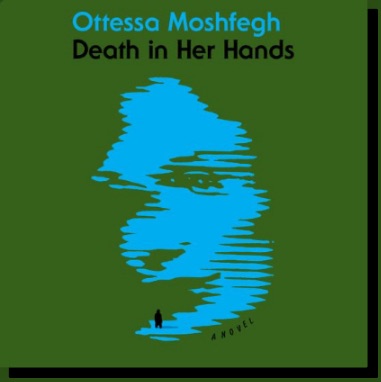Usually I wait until I’m done with a book to write about it, or at least until I’ve formed an impression; but I have a suspicion that the most interesting dimension of Ottessa Moshfegh’s DEATH IN HER HANDS may be the interim confusion. A few spoilers for the first 50% of the book follow, although I am genuinely not sure it matters; actually, the back cover copy for the book spoils more than I’m going to.
We are behind the eyes of Vesta, an elderly widow living with her dog in a new town, who’s just run across a note on a walk. The note describes a corpse: “This is Magda. Nobody will ever know who killed her. It wasn’t me. This is her dead body.” But there’s no corpse in evidence. Vesta decides pretty quickly that she’s not taking it to the police, but obviously she can’t get it off her mind.
We’re living in Vesta’s stream of consciousness more or less in real time, although she presses pause a lot to reminisce about her past, offer observations about her town and her habits, or, increasingly, invent details about Magda and her life. By the halfway point, which is where I am, she’s so stuck into the story of Magda—creating associates, suspects, backstory—that she’s thrown off her routine and starting to neglect the dog.
It’s hard to convey how deeply unhinged this all feels. Vesta is developing Magda’s story from a template for mystery novels that she discovered via Ask Jeeves (the book may be a period piece), but she doesn’t display any particular understanding that she is inventing rather than discovering. There’s a growing sense that the anecdotes about her late husband Walter are covering some kind of resentment, possibly rooted in a very deep injury; she says the decision not to have kids was mutual, but it’s clear that there’s a lot about her marriage that was driven solely by Walter’s preferences, and thoughts about mothering Magda are starting to recur. But these sympathetic readings are smudged by Vesta’s flaws: She is openly disdainful of her town and the people who live there, she describes Magda’s invented Belarussian family as abusive and criminal, she reels off pointless tangents all the time. The Karen energy is palpable.
Palpable enough that it feels like a trap.
I don’t know what kind of trap. But I think I’m less confused about Vesta’s slow divorce from reality than I am about why we are taking so long to get to the point. It’s clearly super important to Moshfegh that Vesta comes off the way she does, dotty and lonely and probably doomed by her social limitations to remain both; but we’re spending so long establishing it that I’m hallucinating morals. Is this an attack on the privileged American woman, on the husband who (maybe?) confined her to a cramped and cold life, on the cozy mystery as an art form, on the conditions of the publishing industry that encourage writing genre to template? On the asshole reader who can’t summon sympathy for a widow alone in the woods? Or is the hallucination itself the intended effect, an invitation to interrogate why anything in a book has to have a point beyond the intrinsic interest it commands by just being what it is?
Further research is needed. Other than the inciting incident, nothing weird has actually happened yet; it’s all in Vesta’s head. But the back cover copy suggests it will not stay that way.
Actually, that’s not quite right. One other weird thing has happened. An accidental click during Vesta’s Internet session brings her to a website selling camouflage hunting gear; and Vesta, for no reason I can remember, decides to buy a black full-body hunting suit. Which is reflected portentously in a character who stands out from the rest, brothers and lovers and landlords: a black “ghoul” whom, thanks to a misplaced stroke of her pen, she christens Ghod.
Deeply unhinged, I said.
That purchase was well timed; I might have set the book down if not for that extra infusion of creepiness. We’ll see how it shakes out.
Currently reading: BLUE PERIOD vol. 5, by Tsubasa Yamaguchi
